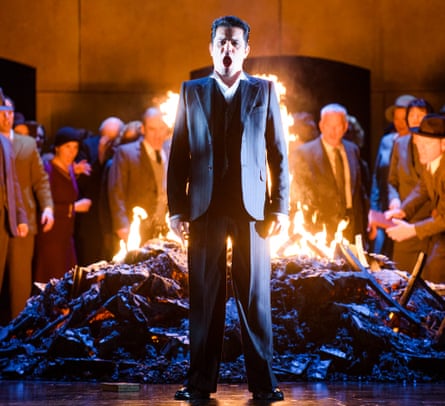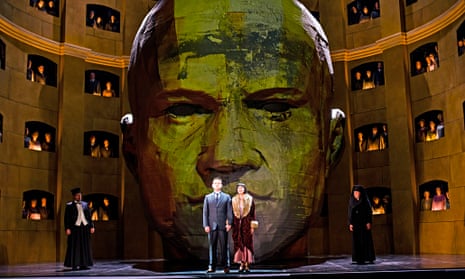It’s almost 40 years since Karol Szymanowski’s only full-length opera has been seen on a London stage. Kasper Holten’s production of Król Roger (King Roger) is also the first by the Royal Opera, and easily the best thing Holten has directed since he became its head of opera.
That doesn’t mean the problems of staging a work that meant more to Szymanowski than anything else he composed – see an illuminating article in the latest issue of Opera magazine for an exploration of that – are all solved. But at least the piece is made plausible on stage, so that the static, oratorio-like sections of the sumptuous score are not as incongruous as they sometimes seem, and its story of a clash between Christian restraint (as embodied in King Roger) and the prospect of pagan, Dionysian abandonment presented by the arrival of the enigmatic Shepherd does acquire some weight and relevance.
It’s easy to be seduced by the beauty of Szymanowski’s orchestral writing, to wallow in its iridescent colours and rich harmonic palette, and forgive the work’s dramatic thinness and the lack of substance in all of the characters but Roger. Holten and production designer Steffen Aarfing lift the story out of its original 11th-century Sicilian setting, with its rich mix of cultures, and place it, to judge from the costumes, farther north in Europe around the time of the 1920s, when the opera was composed. The first act is played out before a giant sculpted head – who that is meant to be is unclear – which rotates for the second to reveal a complex of stairways, with the Shepherd’s retinue of writhing male bodies beneath it.

All that is left for the third act is a pile of smoking ashes on to which the crowd, Roger’s subjects, throw books. We seem to be in a world of psychoanalysis; I’m not sure whether the king’s adviser Edrisi, sung by Kim Begley, is intended to look like Sigmund Freud. It is also unclear if Holten is implying a political dimension, and he can do little about the ambiguity of the ending and Roger’s resistance to the Shepherd’s doctrine. The opera has unanswered questions that no production can resolve.
What the performance confirms, however, is the beauty of much of the music. Antonio Pappano shapes it unerringly, fusing its separate stylistic elements, the touches of orientalism, impressionism and expressionism, into a luminous whole that always seems purposeful, never indulgent. He never doubts that it is a piece of music theatre, even when it sometimes seems more like a symphonic poem with voices – though a 30-minute interval after the second act in a work under 90 altogether is questionable, and undermines the dramatic impact.
The interval was timely, though, for it gave Mariusz Kwiecień, singing the role of Roger and suffering from a heavy cold, the chance to marshal his vocal resources. His performance had an authority and assurance that belied any problems. The Shepherd was Saimir Pirgu, perhaps not quite as suave and seductive as the role implies; and Georgia Jarman was Roger’s wife, Roxana, who had little to do other than sing her famous song in the second act, urging her husband to take up the Shepherd’s ideas, but did it very well. What’s on offer, then, is a musical treat and a less convincing theatrical experience – but that is about as good as it gets with this opera.

Comments (…)
Sign in or create your Guardian account to join the discussion